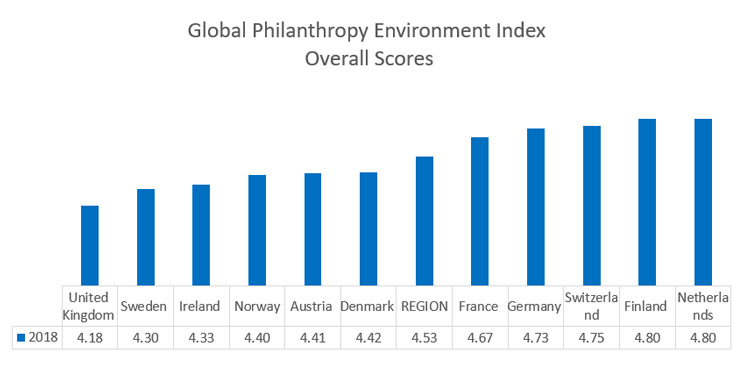Unknown Region
Region details unavailible.
- 5.0–4.5
- 4.49–4.0
- 3.99–3.5
- 3.49–3.0
- 2.99–2.5
- 2.49–2.0
- None (base)
Northern & Western Europe
The Northern and Western Europe region includes economies from Northern Europe (Denmark, Finland, Ireland, Norway, Sweden, and the United Kingdom), and Western Europe (Austria, France, Germany, the Netherlands, and Switzerland).
Austria, Denmark, Finland, France, Germany, Ireland, the Netherlands, Sweden, and the United Kingdom are member states of the European Union, and both Norway and Switzerland are key partners to the European Union. The Northern and Western European regions have an estimated population of 299 million (World Bank, 2016); the countries participating in this study account for 93.7 percent of the population in the region.
View the full Northern & Western Europe region reportAccording to the most recent estimates, the most represented religion is Christianity in various denominations: Roman Catholic, Lutheran, Evangelical, and Anglican. Christianity provides a long-standing tradition of charity in the region and both the Roman Catholic and Protestant Churches offer social services to help those in need and encourage the tradition of philanthropic giving.
Despite this, the region, as the rest of Europe, is projected to see a decline in its Christian population mainly because of the aging of the population. Simultaneously, the religiously unaffiliated populations are expected to grow (Pew Research Center, 2015).
Educational attainment in Northern and Western Europe is relatively high in comparison with other OECD countries. On average, 47.8 percent of 25-34 year-olds completed tertiary education in Northern European countries, including Ireland and the United Kingdom, where this level was 52.0 percent in 2016.
For Northern Europe, Finland had the lowest level with 41.1 percent. Western European countries have slightly lower levels of educational attainment in the same age group, with an average of 41.64 percent of 25-34 year-olds having completed tertiary education; however, at a national level numbers differ significantly. While the level of tertiary education attainment in 2016 in Germany was only 30.5 percent, in Switzerland it was 48.8 percent (OECD, 2017a).
In summary, the Northern and Western Europe regions are characterized by high levels of educational attainment, which may positively influence the development of the philanthropic sector.
The countries in Northern and Western Europe are representative democracies and according to the Freedom in the World report published by Freedom House in 2017, all of them are among the top 30 countries in terms of political rights and civil liberties; Finland, Norway, and Sweden scoring the highest all around the world. Denmark, the Netherlands, Norway, Sweden, and the United Kingdom are constitutional monarchies; monarchs are not allowed to use their political power, but their role in promoting and enhancing philanthropy is significant. Austria, Finland, France, Germany, Ireland, and Switzerland have relatively long histories of republics as a form of governance.
The majority of the countries in the region are democratic welfare states, where social services and benefits are broadly provided by the state. According to Eurostat (2017a), the European Union member states spent between 9.6 (Ireland) and 26.5 (Finland) percent of their GDP on social protection. In social democratic welfare states like Denmark, Finland, the Netherlands, Norway, and Sweden, the government provides social services based on the principle of universalism, while in Christian democratic welfare states, like Austria, France, and Germany, social service provision is based on the principle of subsidiarity.
Despite the fact that Switzerland is characterized as a liberal state that only provides basic needs through means-tested basis (Esping-Andersen 1990, cited by Anheier 2014), the Swiss government spent 13.5 percent of its total GDP on social protection (Eurostat, 2017a).
Despite the advanced level of welfare states, a socio-economic divide has been increasing in the region mainly because of the 2008 economic crisis. While the United Kingdom has the highest levels of income inequality (0.36), Denmark (0.256) and Norway (0.257) are among the most equal European economies in terms of income distribution and poverty (OECD, 2017b).
Neither the level of income nor the level of household disposable income has reached their pre-crisis levels, nor has inequality been reduced. As the Understanding the Socio-economic Divide in Europe report published by OECD (2017c, p. 5) highlights, “inequality can lower social trust in institutions and fuel political and social instability” in the region, such as the rise of antiestablishment parties in Austria, France, and Germany, or the 2016 Brexit vote in the United Kingdom.
With an average score of 4.5, Northern and Western Europe is characterized by high levels of organizational freedom and civic participation as well as by a policy environment favorable to philanthropy.
Philanthropy is deep rooted in the culture of European societies and the importance of individual giving, venture philanthropy, and social investment is increasing while government funding remains a significant source of revenues for philanthropic organizations in the region. On average, tax incentives available to donors and philanthropic organizations and related to cross-border donations are still less favorable than in North America and the Pacific. However, cross-border donations are likely to increase among European member states as a result of the enforcement of the European Union’s non-discriminative legislation.
The arrival in 2015 of a large amount of asylum seekers in Northern and Western Europe has resulted in the establishment of new philanthropic initiatives aimed at addressing the social issues provoked by the refugee crisis. The philanthropic sector is becoming more professionalized, in terms of both management and fundraising. The growth of volunteering and giving are likely to continue increasing in the near future.
Philanthropy across the region appears to be becoming more available through technological innovations, including social media, peer-to-peer fundraising and online crowdfunding. However, the enforcement of the new European Union General Data Protection Regulation in 2018 is expected to increase the administrative burden of fundraising operations across Northern and Western Europe.


